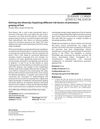43 citations,
April 2005 in “The Journal of Dermatology” Biotin supplements improved skin and hair in a biotin-deficient infant on amino acid formula.
29 citations,
July 1996 in “Acta Paediatrica” Biotin should be added to Japanese amino acid formula to prevent deficiency.
 3 citations,
July 2004 in “SKINmed/Skinmed”
3 citations,
July 2004 in “SKINmed/Skinmed” A 4-year-old girl was diagnosed with erythrokeratodermia variabilis after other treatments failed.
 14 citations,
August 2016 in “Journal of nanomedicine research”
14 citations,
August 2016 in “Journal of nanomedicine research” Zinc oxide nanoparticle biscuits improved growth and health in zinc-deficient rats without toxicity.
 January 2012 in “Vitamins & trace elements”
January 2012 in “Vitamins & trace elements” Smoking and drinking can lower vitamin levels and potentially trigger early hair loss, but overall vitamin levels don't seem to affect hair loss duration.
 October 2023 in “Clinical medicine and medical research”
October 2023 in “Clinical medicine and medical research” Thyroid function may influence hair loss after COVID-19.
 January 2022 in “International Journal of Medicine in Developing Countries”
January 2022 in “International Journal of Medicine in Developing Countries” Many patients with hair loss had low iron and vitamin D levels, but thyroid issues were not common.
4 citations,
October 2011 in “Medical journal of Tabriz University of Medical Sciences and Health Services”  2 citations,
December 2015 in “International Journal of Dermatology”
2 citations,
December 2015 in “International Journal of Dermatology” Washing test helps identify hair loss type, low iron levels significant.
February 2023 in “El-Minia Medical Bulletin”  4 citations,
April 2020 in “Journal of Cosmetic Dermatology”
4 citations,
April 2020 in “Journal of Cosmetic Dermatology” High uric acid levels link to male pattern baldness, especially in young men.
 29 citations,
January 1993 in “Dermatologic Clinics”
29 citations,
January 1993 in “Dermatologic Clinics” Certain medications and maintaining adequate iron levels can help manage women's hair loss.
 June 2015 in “Journal of the turkish academy of dermatology”
June 2015 in “Journal of the turkish academy of dermatology” Eating the right foods is important for skin health and can help treat some skin conditions.
 7 citations,
January 2017 in “Journal of cosmetology & trichology”
7 citations,
January 2017 in “Journal of cosmetology & trichology” Good nutrition is crucial for healthy hair and can help with hair loss without medication.
 2 citations,
February 2014 in “Hair therapy & transplantation”
2 citations,
February 2014 in “Hair therapy & transplantation” Alopecia Areata is an autoimmune condition causing hair loss, influenced by genetics, environment, and possibly improved by anti-MIF therapy, with many patients experiencing regrowth within a year.
 June 2024 in “Research Square (Research Square)”
June 2024 in “Research Square (Research Square)” Copper deficiency is linked to post-COVID-19 hair loss in women.
 May 2024 in “Portuguese journal of dermatology and venereology”
May 2024 in “Portuguese journal of dermatology and venereology” Reassurance and counseling are key in managing acute telogen effluvium, with supplements possibly offering a placebo effect.
 October 2017 in “Iranian Journal of Dermatology”
October 2017 in “Iranian Journal of Dermatology” Clinical exams are good for diagnosing some women's hair loss, but lab tests aren't always needed.
 October 2017 in “The American journal of gastroenterology”
October 2017 in “The American journal of gastroenterology” Three patients suffered severe health issues due to not getting enough vitamins and minerals after weight-loss surgery.
 January 2017 in “International journal of clinical & experimental dermatology”
January 2017 in “International journal of clinical & experimental dermatology” Eating a balanced diet with vitamins, micronutrients, and antioxidants is important for hair health and can help with hair loss.
1 citations,
January 2016 in “American Journal of Clinical and Experimental Medicine” Men with androgenic alopecia have different hair copper levels than those without.
 May 2024 in “Pakistan Journal of Health Sciences”
May 2024 in “Pakistan Journal of Health Sciences” Iron deficiency is linked to hair loss in CTE patients.
 13 citations,
December 2016 in “PubMed”
13 citations,
December 2016 in “PubMed” People with a common type of hair loss have higher stress levels in their body, and treatments that reduce this stress could help.
 October 2024 in “Journal of the Pakistan Medical Association”
October 2024 in “Journal of the Pakistan Medical Association” Genetics, nutrition, lifestyle, and hormones affect early grey hair, but more research is needed.
 14 citations,
January 2018 in “Advances in Clinical Chemistry”
14 citations,
January 2018 in “Advances in Clinical Chemistry” The document concludes that hormonal biomarkers are key for diagnosing hyperandrogenemia in women and hypogonadism in men.
 5 citations,
December 2020 in “BMC Dermatology”
5 citations,
December 2020 in “BMC Dermatology” Bariatric surgery improves skin conditions and metabolism but may cause nutritional deficiencies and hair loss.
 1 citations,
December 2021 in “Pakistan biomedical journal”
1 citations,
December 2021 in “Pakistan biomedical journal” Eating certain seeds may help reduce symptoms of Polycystic Ovary Syndrome.
 3 citations,
April 2022 in “Clinical, Cosmetic and Investigational Dermatology”
3 citations,
April 2022 in “Clinical, Cosmetic and Investigational Dermatology” Different methods, including stress management, healthy diet, supplements, and treatments like minoxidil, can help hair grow back after COVID-19 related hair loss.
 February 2024 in “Medicina-lithuania”
February 2024 in “Medicina-lithuania” Obesity and bariatric surgery can cause hair thinning and temporary hair loss due to nutritional deficiencies and stress.
11 citations,
October 2020 in “Sultan Qaboos University medical journal” Bariatric surgery helps with weight loss but can cause complications and nutritional deficiencies.























